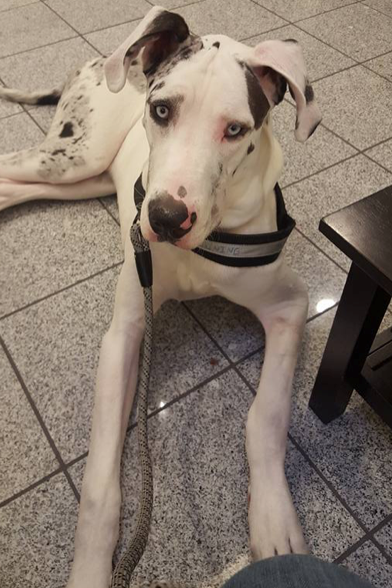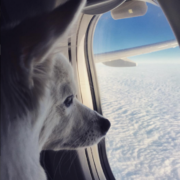As part of our travel tips series and by request, we are featuring a special post on flying with assistance dogs.
Here’s a quick feature on following the rules for everyone’s sake. Traveling with your pet within the United States is currently limited essentially to over the road and by air, as the majority of cruise lines currently do not allow pets unless they are assistance dogs.
Because of the limitations of these means of travel, and the fact that people are flying with assistance dogs who are allowed to fly in-cabin at no additional charge, it is a delicate situation.

We must be careful to not take advantage of the system and falsely identify their pets as Service Dogs or as Emotional Support Animals. While this may seem like a harmless act to many, the fact is this can make it more difficult while traveling for those with a true medical need for the animals, and for the passengers exposed to the dogs.
Flying With Assistance Dogs
As a service dog trainer, I am often flying with assistance dogs to get them to their handlers or for training purposes. On a recent trip to Las Vegas, I picked up a dog in training to transport back to the east coast for task training with our company, 3K9 Working Dogs, Inc.
While this was not an unusual thing for me to do, this particular dog was somewhat of an exception to my usual travels. This dog was a 106-lb Great Dane named Gibbs. Now Gibbs was on point while traveling, he was quiet on the plane and laid next to me patiently during our wait before and between planes.
But, let’s face it, there is nothing discreet about a 106-lb dog, regardless of his level of training. Now, I will admit I was very proud of him and his behavior on his first plane ride, and at only 10 months old, this future mobility assistance and PTSD assistance dog did a great job. That being said, the people around me were the ones that really made the difference in our trip.

Gibbs was a big superstar with just about everyone he met, however, it took two very special people to patiently give up their leg room for Gibbs to stretch out over the 3.5-hour trip from Las Vegas to Atlanta, and then the 1.5-hour trip from Atlanta to our final destination, Wilmington, NC.
And I can’t even begin to give enough credit to all of the crew at Delta. They made all of our accommodations and went above and beyond for Gibbs. Especially the poor flight attendant on our last leg home who had to LITERALLY step over him to serve everyone their drinks, and could not use the serving cart because he would NOT move his legs out of the aisle (in his defense, he had been traveling for 12 hours at that point and was pretty fed up, even the most trained dogs have their limits, let alone puppies in training!).
This flight went as good as I could have hoped for, even better than I imagined. But my point is this: I exposed a lot of people to a dog that day. People who didn’t ask to be sitting next to or around a dog. I walked him past people who were eating, people who were sleeping, and people who would have surely rather had leg room than a big silly dog (well if they were me, they would be happier with the dog, but I digress). Maybe people who were allergic, or scared of dogs.
I made a flight attendant climb over him, a woman scrunch up her legs and a man literally give up his lap when Gibbs decided it was the best available pillow. Everyone one of them was kind and gracious, but did not have to be. I will be eternally grateful they were and hopefully they got some major karma deposits that day, but if Gibbs was not truly a service dog in training, and I imposed him on so many, it really is not fair.
When dogs who are not properly trained and medically required are in public without the proper reason, they make access for others more difficult, and act selfishly in wanting their pet with them more than they want to follow the laws and regulations, and ultimately make life more difficult for those who need it.

Traveling with an assistance dog and your pet can be so much fun! But requiring a dog to be of medical assistance is often not fun and should not be made light of by those wanting the convenience of the current laws and access to identification, regardless of true medical need, is careless and needs to be addressed. More information about public access laws can be found at www.ada.gov or at www.3K9workingdogs.org.

